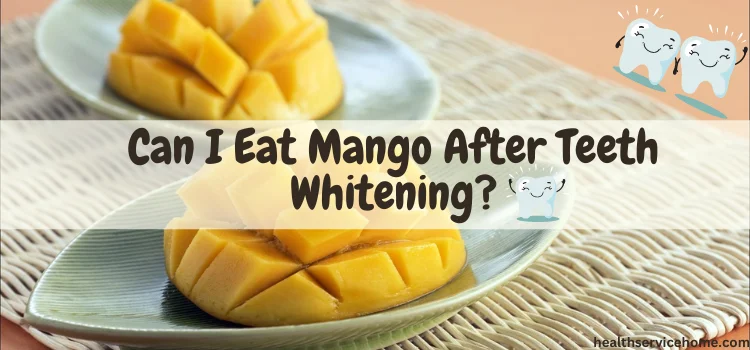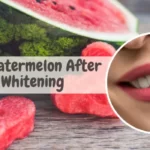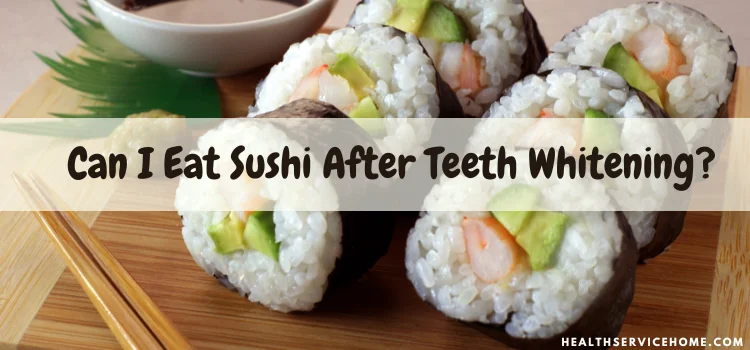Can I Eat Mango After Teeth Whitening Regarding enhancing our smiles, teeth whitening treatments are one of the most popular cosmetic dentistry options available today. However, as anyone who has undergone the process knows, post-treatment care is crucial for ensuring long-lasting results.
Let’s take a closer look at this topic and learn some essential tips and facts about eating mango after teeth whitening.
Avoiding mango for 24 to 48 hours after the treatment is best. This waiting period is when your teeth are most susceptible to staining. Mango is not intensely pigmented, so it’s relatively safe compared to darker fruits.
Table of Contents.
Does Mango Stain Teeth?
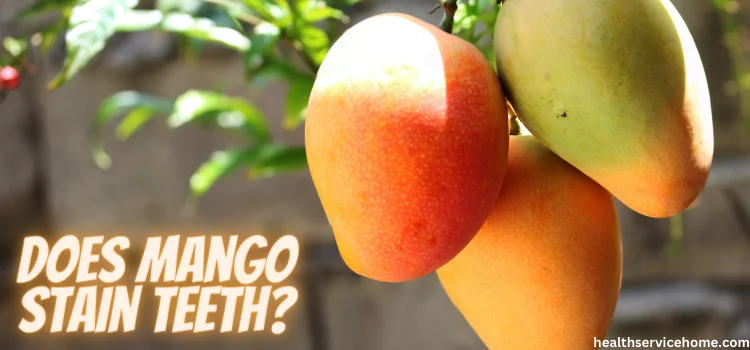
Mango, a favorite among fruit lovers, is delicious and kind to your pearly whites. The bright yellow color of mangoes does not contain the tannins found in darker fruits known to cause staining. Tannins, a plant compound, bind to teeth and lead to discoloration over time.
However, keep this fact from lulling you into complacency about dental hygiene. Like many fruits, Mangoes are high in natural sugars, which can cause dental issues if not appropriately managed.
The sugars left behind on your teeth can fuel harmful bacteria, leading to plaque buildup, which can eventually cause staining and cavities. So, while mangoes won’t directly stain your teeth, neglecting oral hygiene after eating them can indirectly contribute to discoloration.
Can I Eat Mango After Teeth Whitening? Pros And Cons:
Pros
- Non-staining: Mangoes do not have intense pigmentation, so they’re unlikely to cause staining.
- Healthy snack: Mangoes are rich in vitamins and fiber, promoting overall health.
- Low acidity: Mangoes are less acidic than many fruits, reducing the risk of exacerbating post-whitening sensitivity.
Cons
- High sugar: Mangoes have high natural sugar content, which can contribute to plaque if teeth are not adequately cleaned afterward.
- Potential for sensitivity: The cold temperature of a fresh mango might cause discomfort for teeth that have become sensitive following a whitening treatment.
Can I Eat Mango After Teeth Whitening?
After teeth whitening, teeth are temporarily more susceptible to staining. This increased vulnerability is due to the pores on your teeth’s enamel opening up during the whitening process, allowing easy access to colour molecules from food and drink.
During the initial 24-48 hours post-whitening, when your teeth are most prone to discolouration, following a ‘white diet’ is recommended – consuming only light-coloured or straightforward food and beverages. This is where mangoes are a safe choice due to their light colour.
However, as with any food, eating mangoes should still be approached with caution during this period.
While the fruit may not stain your teeth, the high sugar content can be detrimental if oral hygiene is neglected. Brushing or rinsing your mouth after eating mango can mitigate any potential problems.
Can I Drink Mango Juice After Teeth Whitening?
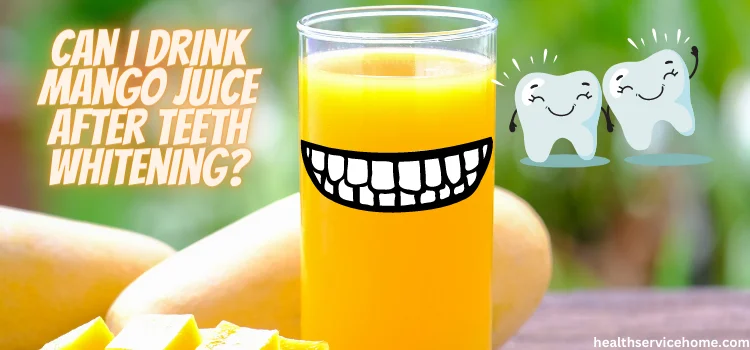
When it comes to mango juice, the answer is more complex. The response depends on whether the juice is fresh or packaged.
Packaged mango juices often contain added sugars and artificial colours that can lead to staining and damage to your teeth.
On the other hand, freshly squeezed mango juice without any added colour is much safer for your newly whitened teeth.
However, even then, it’s best to drink it with a straw to minimize contact with your teeth and rinse your mouth or brush your teeth afterwards to wash away any sugar or potential staining agents.
What Fruit Can I Eat When Teeth Whitening?
Maintaining a nutritious, teeth-friendly diet is crucial during the teeth-whitening process. Consuming the right kinds of fruits can aid in preserving the results of your whitening treatment while still providing your body with the necessary vitamins and minerals.
Here’s a detailed list of fruits you can eat during teeth whitening:
1. Bananas.
Bananas are an ideal choice. They are light in colour and soft, so they don’t require much chewing, which can be beneficial if your teeth are sensitive after the whitening procedure. Besides, bananas are rich in nutrients like potassium, vitamin C, and vitamin B6.
2. Apples (without the skin).
The skin of an apple can potentially stain teeth due to its dark colour, but the flesh of the apple is safe. Apples also have a high water content that stimulates saliva production, helping clean teeth and remove bacteria naturally.
3. Pears.
Pears, like apples, are high in water content and can help clean your teeth. Eating pears can stimulate saliva production, which aids in maintaining oral health. It’s best to peel the pear before eating to avoid any potential staining from the skin.
4. Peeled Grapes.
Grapes can be enjoyed safely if you peel them before eating. The skin of grapes, especially darker ones, can cause staining, so it’s best to remove it.
5. Oranges.
While oranges are citrus fruits and can be slightly acidic, they can still be consumed during teeth whitening because of their beneficial nutrients, such as calcium and vitamin C.
Which promotes oral health. However, be mindful not to consume them excessively due to their acidity, which might increase tooth sensitivity.
6. Strawberries.
Interestingly, strawberries, despite being a coloured fruit, can be beneficial during teeth whitening. They contain malic acid, a natural enamel whitener.
However, like oranges, strawberries should be consumed in moderation to avoid potential sensitivity due to their mild acidity.
Remember, while these fruits are generally safe to eat during teeth whitening, it’s crucial to maintain good oral hygiene by rinsing your mouth or brushing your teeth after consumption to prevent any sugar buildup.
Always consult with your dentist or a dental professional for personalized advice.
What Fruits To Avoid After Teeth Whitening?
After teeth whitening, certain fruits should be avoided to prevent staining and protect your teeth’s sensitivity. Here’s a detailed look at which fruits to avoid:
1. Berries.
Berries like blueberries, blackberries, and raspberries have dark pigments that can stain your teeth. They contain a plant compound called chromogens, known for its intense pigmentation, which can easily adhere to your teeth, leading to discoloration.
2. Grapes (with skin).
Unpeeled grapes, especially the darker varieties, are not advisable after teeth whitening. The skin contains high levels of chromogens, which can stain your teeth.
3. Pomegranates.
Pomegranates, although healthy, have a deep red color that can cause staining. The juice of this fruit can especially leave a residue on your teeth, leading to discoloration over time.
4. Citrus Fruits.
Citrus fruits like lemons, grapefruits, and limes should be avoided because they are highly acidic. The increased acid levels can erode tooth enamel, increasing sensitivity, especially after a whitening treatment.
5. Pineapples.
Pineapples contain an enzyme called bromelain, which can act as a natural stain remover. However, pineapples are also quite acidic. The high acid content can make your teeth more sensitive post-whitening, so it’s best to consume them sparingly or avoid them immediately after treatment.
6. Cherries.
Cherries are another fruit that can cause staining due to their rich, dark pigmentation. The flesh and the juice of cherries can leave a residue on your teeth, leading to staining.
The results of your teeth whitening can be preserved by maintaining a balanced diet and avoiding these fruits. Ensure you rinse your mouth and brush your teeth after consuming fruit to ensure no residues are left on your teeth.
However, everyone’s teeth react differently, so it’s best to consult your dentist for personalized advice.
Can I Eat Mango After Teeth Whitening? Conclusion
It is acceptable to consume mango after a teeth whitening procedure. It’s best to wait 24-48 hours to allow your teeth to rehydrate and remineralize.
Given their low acidity and light color, mangoes are a safe fruit choice post-treatment, provided you maintain good oral hygiene to handle the high sugar content.
Like with all aspects of dental care, individual experiences may vary, so it’s always best to consult your dentist when in doubt.
Can I Eat Mango After Teeth Whitening? Frequently Asked Questions.
Can I eat mango immediately after teeth whitening?
It’s generally recommended to wait 24-48 hours after teeth whitening before consuming mango or any other foods to allow your teeth to recover and reduce the risk of staining.
Can I eat mango if I have sensitive teeth after whitening?
If you experience tooth sensitivity after whitening, consuming cold mango or other cold foods may cause discomfort. It’s best to wait until your teeth regain their normal sensitivity before eating mango.
Should I brush my teeth after eating mango?
Practising good oral hygiene by brushing your teeth after eating mango is essential to remove residual sugars and prevent plaque buildup.
Can I drink mango juice instead of eating mango after teeth whitening?
Freshly squeezed mango juice without added colours or sugars can be consumed after the initial 24-48 hours. However, it’s still recommended to rinse your mouth or brush your teeth afterwards to minimize any potential impact on your whitened teeth.
Are there any fruits I should avoid after teeth whitening?
Yes, it’s best to avoid dark-coloured fruits such as blueberries, blackberries, and raspberries, as well as highly acidic fruits like lemons and grapefruits immediately after teeth whitening, as they can cause staining and increase tooth sensitivity.
Can I eat mango if I have dental restorations, such as veneers or crowns?
Following your dentist’s diet and oral care instructions is essential if you have dental restorations. Mangoes are unlikely to harm dental restorations, but it’s always best to consult your dentist for personalized advice.
A Blogger, Author and Researcher! Gohar Aalam is recognized as a full-time blogger for Health and Tech Niches. I’m a Fountainhead of Healthservicehome.com, will provides high quality knowledge.
